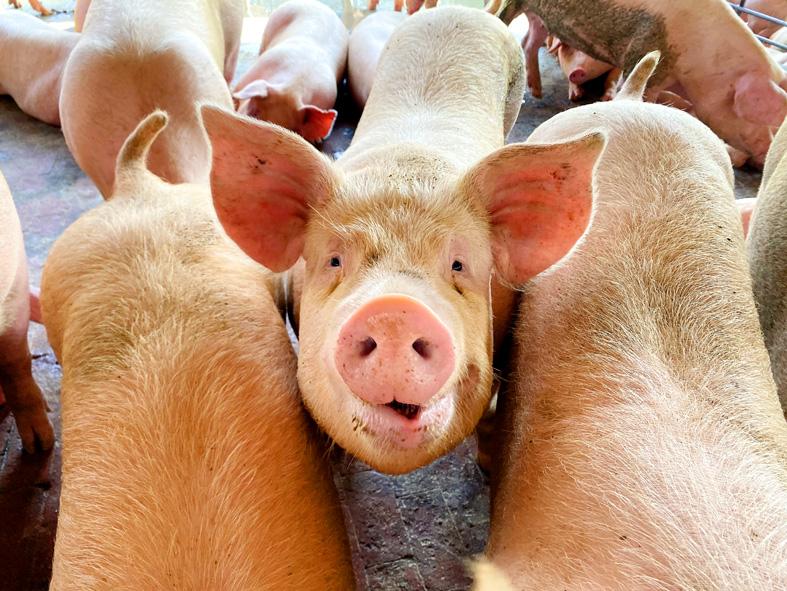The Philippines last month imported a small amount of Taiwanese pork on a trial basis, and plans to import breeding swine from Taiwan to rebuild its hog industry, the Council of Agriculture said on Friday.
The World Organisation for Animal Health (OIE) in June last year declared Taiwan proper, Penghu and Matsu a foot-and-mouth disease-free zone, meaning the nation could finally export its pork products after a 23-year hiatus.
Last year, Taiwan exported 4,500 tonnes of pork products, including canned pork, generating revenue totaling NT$680 million, (US$23.89 million) council data showed.

Photo: Chen Wen-chan, Taipei Times
Macau was the first to accept imports, and in the second half of last year imported 1,628 tonnes of Taiwanese pork products worth NT$140 million, the data showed.
Singapore was another planned destination, but due to the COVID-19 pandemic it was unable to send inspectors to Taiwan.
Nonetheless, the Philippines last month began importing Taiwanese pork products, with quarantine and related administrative procedures going smoothly, the council said.
As Taiwan has kept African swine fever at bay and is known for its quality pork, Manila is keen to import its pork products, as well as more than 1,000 breeding pigs to rebuild its hog industry, which was devastated by the disease.
Meanwhile, the council in November last year began taking applications from local pig slaughterhouses wanting Hazard Analysis and Critical Control Points (HACCP) certification.
The third-largest overseas market for Taiwan’s processed meat, Japan requires HACCP certification for meat imports.
The council said it has received applications from five slaughterhouses, one of which is likely to become the first in the nation to receive the certification by June.
As Taiwan Farm Industry Co and Shinsei Agriculture Technology plan to export meat products to Japan, Tokyo plans to send officials to check their production in May.

Beijing could eventually see a full amphibious invasion of Taiwan as the only "prudent" way to bring about unification, the US Department of Defense said in a newly released annual report to Congress. The Pentagon's "Annual Report to Congress: Military and Security Developments Involving the People's Republic of China 2025," was in many ways similar to last year’s report but reorganized the analysis of the options China has to take over Taiwan. Generally, according to the report, Chinese leaders view the People's Liberation Army's (PLA) capabilities for a Taiwan campaign as improving, but they remain uncertain about its readiness to successfully seize

Taiwan is getting a day off on Christmas for the first time in 25 years. The change comes after opposition parties passed a law earlier this year to add or restore five public holidays, including Constitution Day, which falls on today, Dec. 25. The day marks the 1947 adoption of the constitution of the Republic of China, as the government in Taipei is formally known. Back then the Chinese Nationalist Party (KMT) governed China from Nanjing. When the KMT, now an opposition party in Taiwan, passed the legislation on holidays, it said that they would help “commemorate the history of national development.” That

Taiwan has overtaken South Korea this year in per capita income for the first time in 23 years, IMF data showed. Per capita income is a nation’s GDP divided by the total population, used to compare average wealth levels across countries. Taiwan also beat Japan this year on per capita income, after surpassing it for the first time last year, US magazine Newsweek reported yesterday. Across Asia, Taiwan ranked fourth for per capita income at US$37,827 this year due to sustained economic growth, the report said. In the top three spots were Singapore, Macau and Hong Kong, it said. South

Snow fell on Yushan (Jade Mountain, 玉山) yesterday morning as a continental cold air mass sent temperatures below freezing on Taiwan’s tallest peak, the Central Weather Administration (CWA) said. Snowflakes were seen on Yushan’s north peak from 6:28am to 6:38am, but they did not fully cover the ground and no accumulation was recorded, the CWA said. As of 7:42am, the lowest temperature recorded across Taiwan was minus-5.5°C at Yushan’s Fengkou observatory and minus-4.7°C at the Yushan observatory, CWA data showed. On Hehuanshan (合歡山) in Nantou County, a low of 1.3°C was recorded at 6:39pm, when ice pellets fell at Songsyue Lodge (松雪樓), a